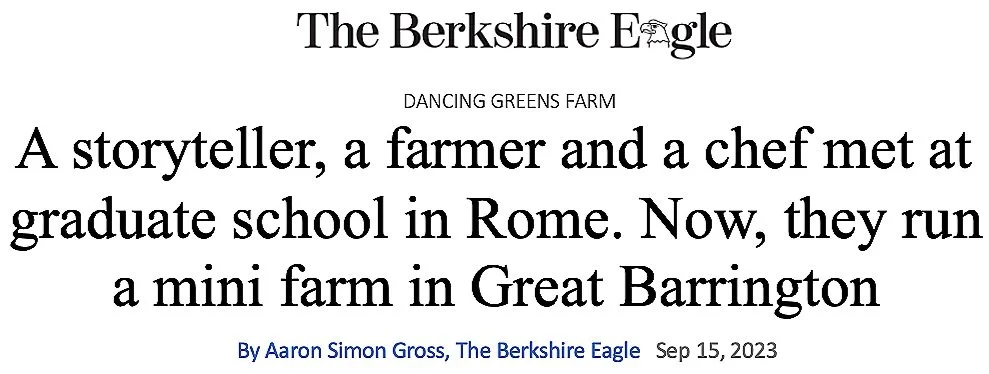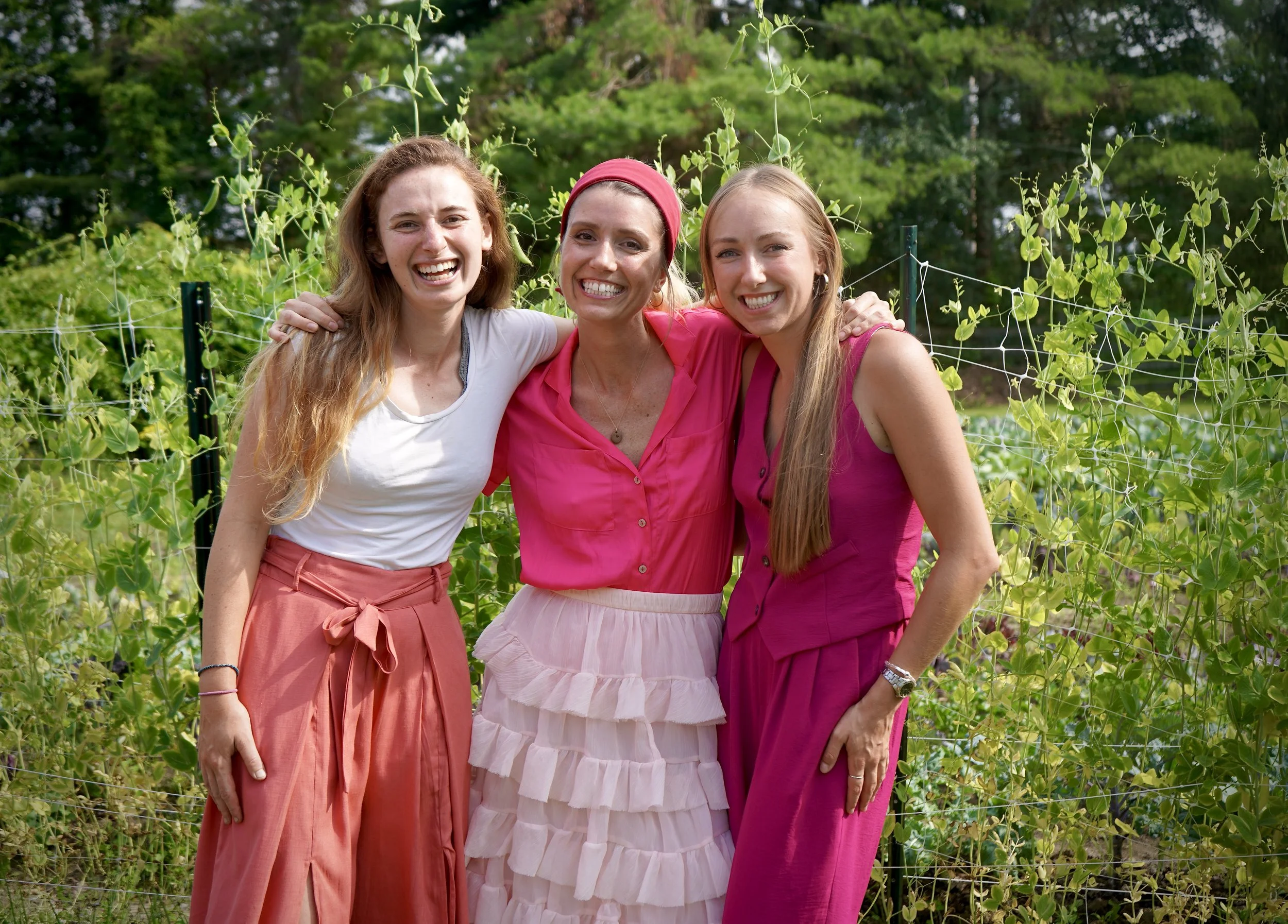Dancing Greens co-founders Jamie Nadler, left, Madison Warren, center, and Madi Taylor, right, on their mini farm in Great Barrington, which they see as an American spin on an "agriturismo."
PHOTO BY SARA S. WALLACH
GREAT BARRINGTON — “Wait, you want to start a farm, too?”
Hiking through olive trees in Tuscany, Jamie Nadler turned to Madison Warren with this simple question. The answer was a resounding "yes." And within two years, that "yes" would grow into Dancing Greens Farm, which the two co-founded with Madi Taylor on Blue Hill Road this summer.
Over the course of the past year, the three women — who met in a food sustainability master's program at the American University of Rome — have redirected their lives toward the Berkshires.
Here, they’re building an American variation on the "agriturismo," an Italian concept bridging farm, restaurant and vacation destination.
On a recent Wednesday afternoon, Taylor and Warren were romping around the mini farm in matching pinks, seemingly still not able to wrap their heads around the fact that the farm actually exists. Earlier that morning, it was pouring but now, it’s 75 F and sunny with a light breeze: a perfect day.
As recently as March, the farm held nothing more than grass and a fence. Six months later, the two traverse a bounty of produce, waiting for Nadler to arrive from her day job at Indian Line Farm.
Of the trio, Nadler is the farmer, committed to cultivating a space without pesticides, chemical fertilizers or tilling the soil. The others refer to her as “Farmer Jamie” with a tone suggesting an in-joke that's morphed into a loving moniker.
Warren is the cook, a culinary school graduate creating dishes from produce grown on the farm's compact half-acre, with special attention to food intolerances; Nadler is vegetarian, Warren is lactose-intolerant and Taylor has celiac disease. Warren is also an expert at getting small businesses off the ground; as one of the first employees at SoulCycle, she opened more than 50 of the company’s locations.
Taylor is more nebulously referred to as their “storyteller and connector,” a position that entails "connecting with the people we want to partner with, and helping share our story with the community," she said, though she resists labels like "advertising" or "marketing."
DREAMS BECOME A SMALL REALITY
When they conceived Dancing Greens in Rome, they dreamed of what it might include in five or 10 years: multiple kitchens so there’d be one for each allergy, lots of animals, a place for visitors to stay, residencies both for students and professional artists. They imagined a bucolic spot that grew terrific produce, turned that produce into beautiful meals and connected people to agriculture. But how could they turn it into something real now?
The answer to that question, and the secret to their success on that front, they say, is Nadler.
“Farmer Jamie was born to be a farmer,” Taylor said.
Just then, Nadler arrives from Indian Line Farm, where she spends five days a week. Her first job on a farm was at Blue Hill, just across the street and the three have ended up here because Nadler’s family had property in Great Barrington.
"We're only able to do this because of how fortunate I am," she said. "We're incredibly lucky my family is letting me do this."
Joining her friends on a patch of grass, Nadler points to a nearby herb garden overflowing with basil, sage, thyme, lemon balm, mint, oregano and lavender, the scents of which mingle in the air.
“Everything you see here was done in March,” she said.
Warren points to a pipe coming from a small body of water nearby.
“Look at the PVC pipe going out the pond,” Warren says. “Farmer Jamie built our irrigation system from scratch.”
Nadler created a trench for the electrical wire to pump water from the pond and through a strainer, to individual valves for every bed, each having its own sprinkler and pipes.
“It was only hard because I’m not a plumber or electrician and I’d never done it before,” she said.
They could have just bought that system, but Nadler did it all herself, she says, “because we were being scrappy about it."
Nadler has separated the area into eight 30-by-30-feet garden bed blocks, named after their grandmothers.
VARIETY NOT VOLUME
The women are growing produce for relatively small meals, so they’re less worried about volume than variety.
“We’re focused on having a hyperdiverse amount of food in a really small space,” Nadler said. For years, she herself flirted with the idea of having her own farm. But she wasn’t sure what form that could take — it's tough to financially sustain a farm through selling produce wholesale and she was reticent about contributing to social and structural issues in food systems.
Taylor, who has studied agriculture and grew up on a farm in Minnesota, shared those concerns.
Warren, too, had been distraught by the question of how to fix food systems, at least from a policy perspective.
“Starting with the soil felt more approachable," she said. “I know we’re doing something so tiny it can’t scratch the surface of anything but just bringing people around a table, hearing Farmer Jamie talk about how flooding impacted crops and why carrots are smaller this year — maybe it’ll get people to think about the food they’re eating a little differently.
"A revolution needs to start from the bottom. Right?"
In addition to Nadler's work on the farm, Warren and Taylor have slowly been extricating themselves from their own day jobs: Warren as a freelancer helping small businesses expand their footprint and Taylor is doing farm work in Minnesota.
But each time they've welcomed guests onto the farm, they say, it's brought goosebump-inducing euphoria.
Since they kicked off Dancing Greens' first season in July, the women have thrown occasional “shindigs” — the catch-all phrase used to encompass educational workshops, meals, retreats and any other yet-to-be-devised experience.
"It's the only thing I could imagine doing," Warren said. And they delight at the idea of expanding their space, and bringing more people in.
At a recent shindig, they hosted workshops in a flower art, fermentation, composting and more. In October, they’re looking forward to welcoming their first retreat — a four-day, 3-night program with multiple ways to participate. And as for next season, or the one after that?
“If anyone’s trying to get rid of one hundred acres of land, tell them I know some people," Taylor said with a laugh.


